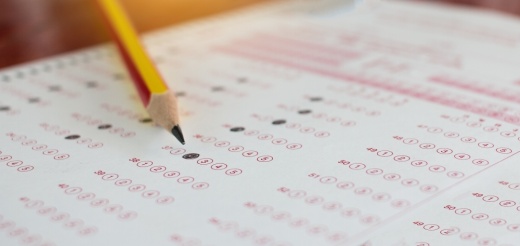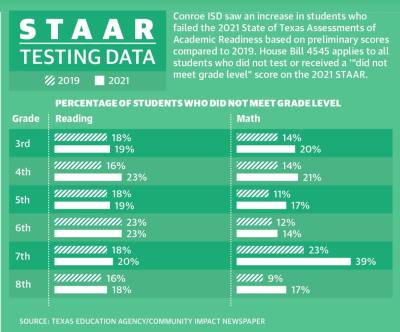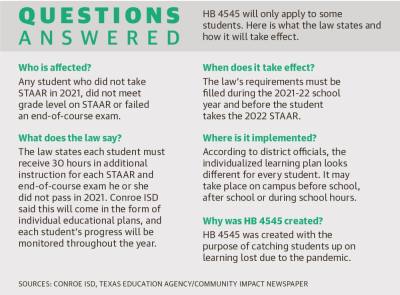HB 4545 was signed into law by Gov. Greg Abbott on June 16 and is required for the 2021-22 school year, which started Aug. 11.
According to the Texas Education Agency, HB 4545 requires districts to provide accelerated instruction for students in third to eighth grades who did not pass the State of Texas Assessments of Academic Readiness or students who did not pass an end-of-course exam.
The TEA defines accelerated instruction as supplemental tutoring before, after or throughout the school day, or assigning the student a classroom with a teacher who is a certified master, exemplary or recognized teacher. Students who are considered to have failed STAAR received a “did not meet grade level” score or did not take the test. Students who did not test are automatically enrolled in the accelerated learning program; however, the district may determine if the student requires accelerated instruction. Each student who qualifies for HB 4545 will receive an individual educational plan, and the student’s progress will be monitored throughout the year.
According to district officials, CISD campuses are in the process of creating accelerated learning plans.
“We are currently working through the new requirements defined in House Bill 4545 with the greatest challenges being staffing and time,” CISD Director of Communications Sarah Blakelock said. “While the pandemic impacted the job market across the country, Conroe ISD has also experienced significant growth and is currently exceeding our 2021-22 enrollment projections of 66,298 by over 1,400 students.”
Urgency looms
Parents of students protected under Section 504 of the federal Rehabilitation Act of 1973—students who have a physical or mental impairment—and who qualify for HB 4545 said receiving an individual education plan is typically positive news. However, there is uncertainty regarding how Section 504 students will catch up. Information on how many Section 504 students did not pass the STAAR tests was not available from the TEA.
Nicole May, the mother of a dyslexic fifth-grader at CISD, said her son did not pass the reading and writing STAAR in spring 2021, making him a candidate for HB 4545.
May said she has concerns regarding how her student, who already receives daily dyslexia tutoring from the district, will find time in the school day to complete the requirements.
“The reality for our dyslexic students is that [they] are the ones that did not pass the STAAR,” May said. “The COVID[-19] year last year did affect our students, and they have regressed, and that’s clear.”
CISD Dyslexia Coordinator Sharon Henry said she has seen dyslexic students regress during the pandemic like the majority of CISD students have. “That is a concern,” Henry said. “We have a lot of schools, though, that are working really hard to create a plan so that it’s not very disruptive.”
However, Henry said she anticipates positive results from the individualized program.
“They’re not going to be pulled out and put on a computer,” Henry said. “It’s where we take what we do in the classroom ... and we specifically target what that individual student needs. ... I think about it as an extension of the instruction that we do within the classroom.”
CISD Director of Special Education Kendra Wiggins said since the start of the pandemic there have been conversations regarding how to catch up each student. She said HB 4545 gives teachers a set of regulations to follow. “Now [individual learning] has a certain amount of hours and different things to it, where before, we may have felt that we could do that in a less amount of time,” Wiggins said.
Addressing lost learning
Since the pandemic, CISD has implemented a variety of strategies to address learning loss.
Officials said they determine learning loss from standardized test scores, which show a decrease from 2019 to 2021. CISD continues to address lost learning with federal funding to hire more educators and fund additional programs, officials said.The district saw a decline in 2021 preliminary STAAR scores compared to 2019 scores. However, CISD remained above state averages.
“Campuses utilize before-school tutorials, increased small group instruction, after-school tutorials and a variety of other learning structures to address the needs of their specific student population,” Blakelock said. “Each day of instruction brings a sense of urgency, and House Bill 4545 only reinforces the importance of quality learning experiences for every student.”







